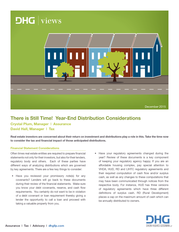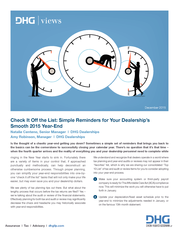Getting to the Bottom of the Top Line - Preparing to Adopt the New Revenue Recognition Standard – March 2016-04-11
Dixon Hughes Goodman
Description
views
Specific areas to consider include:
technology. For example, consider whether any key
billing system processes may be impacted by the new
revenue recognition standard.
• Marketing and Sales Operations – While this may not
initially be a core accounting change, the new standard
may impact processes for sales and/or service contracts
to customers.
• Geographic Impacts – Consider whether the standard
will impact foreign and remote operations.
• Key Legal Agreements – Legal agreements between
companies might have sales terms embedded.
• People – Consider which financial and non-financial
employees will need to be involved in managing and
implementing the change. How will non-financial
employees be impacted?
• Debt Covenants – Standard debt covenant calculations
that are generated from revenue related data could be
impacted.
• External Auditors – Communicate with the external
auditor, as appropriate, about the expected impact of
transitioning to the new standard.
• Tax – There are several instances in which the new
revenue recognition standard for financial accounting
purposes may impact a company’s tax reporting and the
financial reporting for taxes.
Conclusion
The new revenue standard has the potential to significantly
impact a company’s reported results, accounting processes
and controls, and even general business operations. While
the magnitude of the impact will vary across industries,
companies should begin the implementation process now to
ensure a smoother transition.
• Key Financial and Operational Controls – How will
changes to revenue processes impact key financial,
operational and technology related controls?
• Technology – There will likely be changes to information
technology and impacts to key controls around
How DHG Can Help
DHG’s Accounting Readiness team is positioned to help
companies think through how the new revenue standard will
impact their reported results and accompanying disclosures,
accounting processes and controls, and other areas of
their business.
Understand
the guidance
For further details about how our Accounting Readiness
team can assist your company, please contact us at
riskadvisory@dhgllp.com.
Assess
the impact
Get the
accounting right
• Provide CPE-eligible
trainings for a company’s
key stakeholders
• Help inventory key revenue
streams and related
processes and controls
• Perform accounting
analyses on different
revenue streams
• Provide DHG thoughtware
on forthcoming accounting
changes
• Provide a comprehensive
impact assessment
(accounting, tax, operations,
systems, etc.)
• Design and implement
new accounting
processes and controls
• Draft new revenue
disclosures and
accounting policies
1. The formal effective date for public companies is annual reporting periods beginning after December 15, 2018, including interim periods within that reporting period.
For private companies, the effective date is annual reporting periods beginning after December 15, 2018, and interim periods within annual reporting periods beginning after December 15, 2019. 2. Refer to ASC 606-10-50-1. Assurance | Tax | Advisory | dhgllp.com 5 .
For private companies, the effective date is annual reporting periods beginning after December 15, 2018, and interim periods within annual reporting periods beginning after December 15, 2019. 2. Refer to ASC 606-10-50-1. Assurance | Tax | Advisory | dhgllp.com 5 .
Regulations Presentations
+
Regulations Sub Categories














